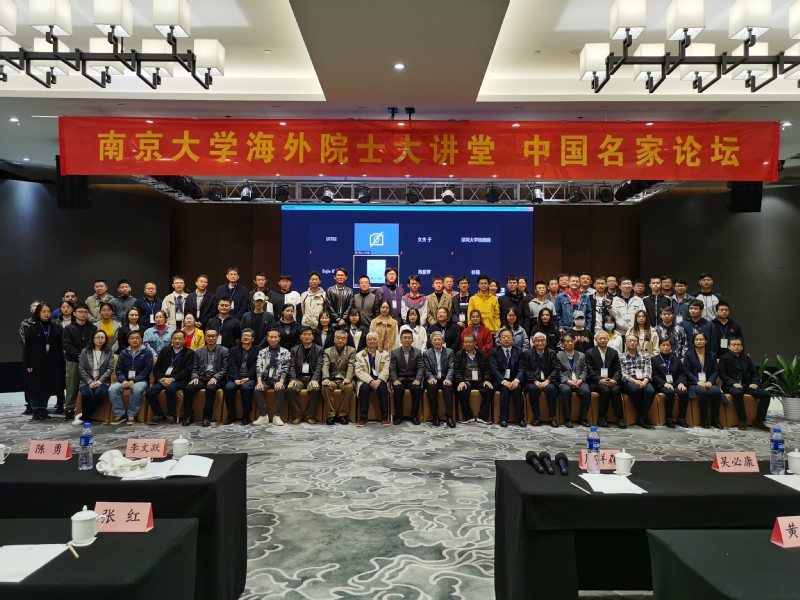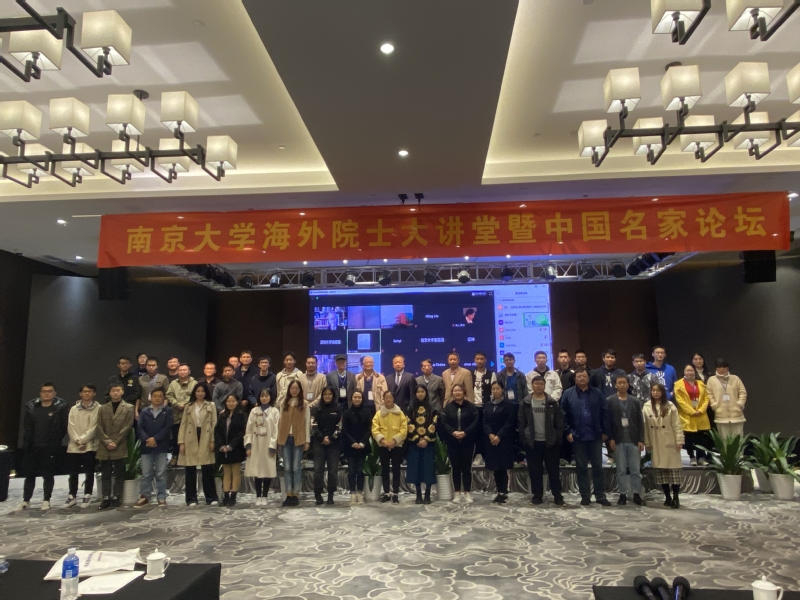
The School of History succeeded in hosting the "Overseas Academician Lecture Series and Chinese Masters Forum" at the Zijin Hall of the International Conference Center from November 20 to 22, 2020.
More than 150 specialists, scholars and students from famous universities and research institutions at home and abroad attended the conference, including University of Oxford, University of London, and University of Edinburgh in England, Cairo University in Egypt, Quaid-i-Azam University in Pakistan, International University of Kagoshima in Japan, and Peking University, Fudan University, Wuhan University, Jilin University, Sichuan University, Renmin University of China, Northeast Normal University, East China Normal University and others.
Professor Pat Thane, academician of the British Academy, Professor Ali, president of Quaid-i-Azam University, and Professor Lu Yanqing, vice president of Nanjing University, attended the meeting and delivered speeches respectively.
The forum was presided over by Professor Yu Wenjie, director of NJU’s Institute of British and Commonwealth Studies and vice president of China Association of Modern and Contemporary World History.
The forum brought together 30 specialists from leading universities and national cultural heritage inheritors at home and abroad to deliver academic speeches. Their presentation focused on three themes.
The first theme was "British and Commonwealth Studies." Professor Pat Thane, a member of the British Academy, gave a speech on "A Study of the History of Social Divisions in Britain Since 1900." He demonstrated the polarization of British society in terms of political, economic, and social welfare issues and many other existing problems over the past 100 years from historical investigations in different regions and different periods.
Professor Harry Dickinson, former chairman of the Royal Historical Society, gave a speech on "The Abolition of Slave Trade in Britain." He made full use of historical documents, especially images and statistics, to produce great effects and academic impact.
The third speaker was Professor Stephen Gunn, of the University of Oxford. He gave a speech on "Accidents of Industry in Sixteenth Century England." The lecture was based on thousands of investigation reports on fatal accidents and analyzed the causes of death cases in many industries. Many affairs and their governance experience have practical significance.
The fourth speaker Bill was a senior lecturer from the University of Edinburgh. He gave a speech on "New British History and the First British Empire." He stated that the Norman Conquest changed the history of Britain; whether through military conquest or the influence of cultural soft power, it had an important impact on the formation of the First British Empire.
The fifth speaker was Professor Shafloue from the Bahauddin Zakariya University of Pakistan. He gave a speech on "The Commonwealth: Decolonization and the Rise of Nationalism." He examined the historical transition from the British Empire to the Commonwealth and the rise of nationalism in Britain itself. The independence of the Commonwealth nation-states and the outbreak of Brexit and Scottish referendum are also important signs of the rise of nationalism.
The Chinese specialists in British history also made a series of speeches.
Wu Bikang, a research fellow of the Chinese Academy of Social Sciences, gave a speech on "British Democracy and Its Progressive Path." The speech, in which he put forward his own views, reviewed the hisoty by demarcations of periods: Magna Carta, 1640 Revolution and 1832 Reform.
Professor Chen Xiaolyu, of Nanjing University, gave a speech on "Helpless Response: A Review of English History 1914-1945 by A. J. P. Taylor."
Professor Meng Guanglin, of Renmin University of China, gave a speech on "The Political Principles and Historical Destiny of Magna Carta,” explaining in detail the historical background of the Magna Carta, its ideological content and many reflections on historical research issues.
Professor Liu Jinyuan, of Nanjing University, gave a speech on "From Paternalistic Control to Collective Bargaining: The Way to Resolve Labor Management Conflicts in Modern Britain." The speech discussed in detail the responsive ways and its historical transformation on labor management conflicts in modern Britain.
Professor Yu Wenjie, of Nanjing University, commented on the views and documents of the excellent speeches given by historians from Britain and the Commonwealth countries and also commented on the legitimacy of historical events and historical writings.
The second theme was "World History and International Issues Studies."
Professor Han Dongyu, convener of the disciplinary review group of the State Council and a vice president of Northeast Normal University, gave a speech on "The Starting Point of East Asian Fission." Based on cases and materials, he made a detailed discussion on the differences and uniqueness of many ethnic groups in East Asia, especially those of the Japanese nation.
Professor Gao Yi, president of the Chinese Association of Modern and Contemporary World History, gave a speech on "A New Analysis of the Essentials of the French Revolution." He introduced many contentious viewpoints on the nature of the "French Revolution" and made a new interpretation of its value to nation building and issues of democracy, freedom and equality.
Professor Liu Debin, of Jilin University, a well-known specialist on international issues, gave a speech on "Several Issues in the Current Studies on International Issues." Based on the background of "a hundred years of change," he made a comprehensive discussion on issues of the history and modernity of empires, the evolution of the relationship between the West and the East, and the world system and the rise and fall of great powers.
Professor He Ping, of Sichuan University, a well-known historian, gave a speech on "The World of Personality in The Analects, the Original Classics of Chinese Culture." He started from many core categories of the Chinese classics and obtained a truthful interpretation of the "world of personality" in the comparison of historical contexts.
Professor Chen Yong, of Wuhan University, a famous historian, gave a speech on "Historical Thoughts under Contemporary Pandemic and Changing Situations." Based on historical cases and literature investigation, he revealed the "Eyam Plague" and its modern significance.
Professor Li Hongtu, of Fudan University, a famous intellectual history studies expert, gave a speech on "Thinking about the ‘History’ in the Research of the Intellectual History." He took many case studies by researchers as the objects of investigation and discussed the challenges facing the intellectual history studies from its context, historical writing and interpretation of meaning.
Professor Pang Zhongying, a well-known specialist on international issues and dean of Institute of Marine Development of Ocean University of China, gave a speech on "The Future of Global Governance: Comparison and Reflection." He examined the formation of global governance organizations and their theories and events and discussed the trend of global governance and China’s academic propositions.
The third theme of discussion was "The Belt and Road and Traditional Culture."
First, Professor Mu Tao, a member of the Disciplinary review group of the State Council and executive dean of the School of History, of East China Normal University, gave a speech on "The Maritime Silk Road and the Integration of Civilizations between China and Africa." Based on many historical and archeological documents, he made a comprehensive survey and discussion of many historical relics on the Maritime Silk Road between China and Africa.
Research Fellow Liu Shuguang, from the State Administration of Cultural Heritage, gave a speech on "Strategic Planning and Innovative Development for World Heritage in China." Starting from the grand picture of an international academic perspective, he put forward a series of views on the strategic patterns of China’s world cultural heritage, as well as the formulation and construction of China’s plans.
Professor Molson from Cairo University gave a speech on "Copper and Coppersmith in Ancient Egypt." Based on rich literature and case studies and with many images and photos, he explained the cultural connotation and international influence of the Egyptian coppersmiths and their works.
The Fifteenth Chin Jukan (Shim Soo Kwan), a Japanese national cultural heritage inheritor, gave a speech on "Cultural Heritage in World History: Kagoshima Satsuma." Based on the historical investigation of Kagoshima Satsuma and his family experience, he explained that the national culture still has strong power to survive and spread despite the context of colonialism. Although his family was forced to come to Japan during the Toyotomi Hideyoshi era, it still adhered to the traditional culture. He believed that as a traditional ceramic art, it was rooted in China, passed through South Korea, and then came to Japan.
Liu Ketang, a master of Chinese arts and crafts and inheritor of national cultural heritage, gave a speech on "Studies on History Documents of Chinese Inkstone Culture." He elaborated on his propositions through case studies and literature surveys of the Chinese inkstone culture in different eras and periods.
Research fellow Jin Wen, a master of Chinese arts and crafts and inheritor of national cultural heritage, gave a speech on "Intangible Heritage and the Inheritance of Craftsmanship." He started from the etymological investigation of the term "craftsman," discussed the expression of "craftsman spirit" in different historical periods and his own practical experience, and explained the practical significance of "craftsman spirit" in the new era.
Professor Li Wenyue, a master of Chinese arts and crafts and inheritor of national cultural heritage, gave a speech on "External Cultural Elements in Famille Rose Porcelain." He took "painted enamel" and its influence on China's Jingdezhen famille rose porcelain as a case and discussed the great significance of cultural exchange to the development of traditional cultures of various ethnic groups.
Research fellow Huang Zhiwei, a master of Chinese arts and crafts and representative inheritor of Shiwan pottery, gave a speech on "Traditional Cultural Innovation in the New Era." Starting from the far-reaching history of Shiwan pottery, he examined the trajectory of Shiwan pottery art in history and the new era, the masters’ teams and their artistic innovation, international influence and great significance in this era.
Research fellow Liang Xuefang, a master of Jiangsu provincial arts and crafts and the representative inheritor Guxiu embroidery, gave a speech on "Embroidery is My Way of Dialogue with Life." She explained her life experience and philosophical pursuit of life in embroidery art from her learn at home to learning from her master.
Research fellow Xu Qu, a national senior craftsman and representative inheritor of the fifth generation of Xumen Zisha, gave a speech on "Craftsman’s Artistic Pursuit and Generations of Inheritance." He started with a historical investigation of the profound origins of Xumen Zisha and explored its cultural connotation and artistic innovation by taking historical documents and works as the research objects.
Associate Professor Cheng Yajuan, from Nanjing University of the Arts, gave a speech on "The Earliest Vedic Mythology Scrolls Unearthed in Turpan." Using the method of comparison and mutual verification between history and archaeology, she questioned the traditional views put forward by German archaeologists and brought up her own thoughts and inferences on the cultural heritage unearthed in China.
The forum was completed on the afternoon of November 20, 2020. As vice president Lu Yanqing said in his speech, the forum helped promote exchange and cooperation between well-known universities and research institutions in China, helped raise the levels of education and research in humanities and social sciences in our university, and helped with our project of disciplinary construction.
With the strong support of experts from Britain and Commonwealth countries, Chen Xiaolyu’s team has been active and innovative. Achievements like the multi-volume "History of British Civilization," co-edited by Professor Yu Wenjie of our university and Professor William Elder from the University of Edinburgh, represent Nanjing University’s further internationalization of the humanities and social sciences such as the British history.
Vice President Lu said that "Interviews on the Traditional Cultures of Countries Along the Belt and Road," co-edited by Professor Yu Wenjie and Professor Ali, president of Quaid-i-Azam University, has contributed to mutual learning among civilizations and the building of a community of human civilizations.


